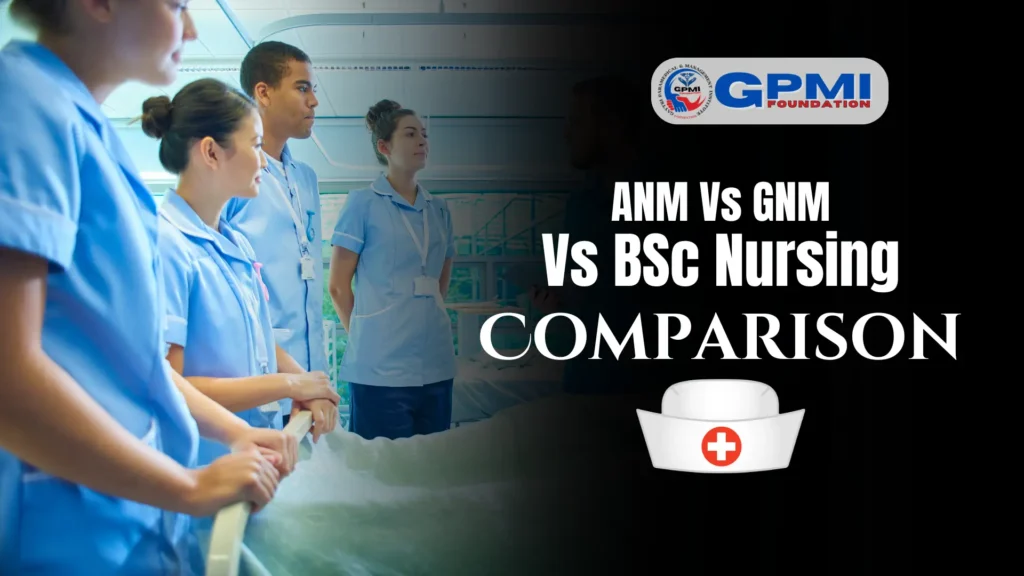If you’ve just finished your Class 12th exams and want to build a career in nursing, you’re on the right path. Nursing is not just a job — it’s a respected and rewarding profession in the medical field. But here’s the big question: Which nursing course should you choose — ANM, GNM, or BSc Nursing?
All three are popular options and can lead to good job opportunities, solid career growth, and decent pay — even without going for an MBBS degree. But you can’t take all three courses at once, so it’s important to understand the differences between them.
Each course — ANM (Auxiliary Nurse Midwifery), GNM (General Nursing and Midwifery), and BSc Nursing — has its own strengths, length, eligibility, and career scope. Some are better for quick jobs, while others offer more advanced roles and better salaries.
In this article, we’ll break down the details of each course ANM vs GNM vs BSc Nursing so you can decide which one suits your career goals best. Whether you want to start working early or aim for high-level nursing roles in hospitals or abroad, we’ve got you covered.
Let’s explore: ANM vs GNM vs BSc Nursing — what makes each course different, and which one is the right fit for you?
Table of Contents
Nursing as a Career

If you dream of helping people and making a real difference, nursing is a powerful and rewarding career choice. Courses like ANM, GNM, and BSc Nursing open the door to becoming a skilled nurse and a key part of the healthcare team.
Nurses are the true backbone of hospitals and clinics. They work day and night to take care of patients — whether it’s helping in emergencies, looking after sick people in wards, or being frontline heroes during crises like COVID-19. They provide comfort, care, and hope when people need it the most.
Take the story of Priya Sharma, a GNM-trained nurse from Delhi. During the COVID-19 outbreak, she worked 12-hour shifts in a busy hospital. “It was tough,” she says, “but when a patient recovers and smiles at you, it makes everything worth it.”
Nurses like Priya show how valuable this profession is. They are trained to save lives and support both patients and their families. If you want to be someone who makes a difference every single day, nursing might be the perfect career for you.
India’s Nursing Sector: Vital Stats You Need to Know
- India’s nurse workforce makes up more than 60% of the total health workforce. This means nurses play the biggest role in running hospitals, clinics, and healthcare centers across the country. From caring for patients to assisting doctors, nurses are involved in every step of the treatment process.
- India is the second-most populated country in the world, but there are not enough nurses to take care of everyone. According to the World Health Organization (WHO), there should be at least 3 nurses per 1,000 people. But in India, we only have 1.7 nurses per 1,000 people — that’s 43% lower than the global standard.
- This shortage has created a huge demand for trained nurses in both government and private sectors. If you become a qualified nurse, you won’t just find a job — you’ll find many career options with good salaries and growth.
- As of March 2020, India had around 3.07 million registered nursing professionals. Even with these numbers, the gap between demand and supply is large — especially in rural areas and community health centers.
- Nurses care for people during their most difficult times. It’s a career filled with purpose and pride. Many Indian nurses are also working abroad in countries like the USA, UK, Canada, and Australia, where the demand is even higher, and salaries are much better.
- If you’ve completed your 12th (especially with science), nursing is a smart career choice. You can choose courses like ANM, GNM, or BSc Nursing and build a stable, respected, and rewarding future. Here’s what nursing gives you:
- Job security
- Good salary packages
- Opportunity to work in India and abroad
- A respected role in society
- A chance to serve humanity
ANM Vs GNM Vs BSc Nursing
Here’s a comprehensive comparison table of ANM Vs GNM Vs BSc Nursing courses, designed to help you choose the best course after Class 12th:
| Feature | ANM (Auxiliary Nurse Midwifery) | GNM (General Nursing & Midwifery) | BSc Nursing (Bachelor of Science in Nursing) |
|---|---|---|---|
| Duration | 2 years (including internship) | 3.5 years (including 6-month internship) | 4 years (including clinical training) |
| Eligibility | 10+2 (Science/Arts stream) | 10+2 (Science stream preferred) | 10+2 with Physics, Chemistry, Biology (45-50% marks) |
| Course Level | Diploma | Diploma | Undergraduate Degree |
| Entrance Exam | State Nursing Boards | State Nursing Boards | State/University-level Exams |
| Average Fees | ₹10,000 – ₹50,000 | ₹50,000 – ₹2 Lakhs | ₹1 Lakh – ₹5 Lakhs |
| Difficulty Level | Easy to Moderate | Moderate to Hard | Hard (Extensive medical training) |
| Curriculum Focus | Basic nursing, maternal & child health, community health | Comprehensive nursing, midwifery, patient care | Advanced medical sciences, nursing research, clinical practice |
| Career Opportunities | Rural health centers, maternity care, NGOs | Hospitals, clinics, private sector | Government & private hospitals, research, teaching, abroad opportunities |
| Starting Salary | ₹10,000 – ₹15,000/month | ₹15,000 – ₹20,000/month | ₹15,000 – ₹25,000/month |
| Career Growth | Limited (Can upgrade to GNM) | Good (Can pursue BSc Nursing) | Excellent (Can pursue MSc Nursing, PhD, work abroad) |
ANM Vs GNM Vs BSc Nursing:-Comparison

Choosing the right nursing course is crucial for aspiring healthcare professionals. In India, three primary pathways—ANM (Auxiliary Nursing Midwifery), GNM (General Nursing and Midwifery), and BSc Nursing (Bachelor of Science in Nursing)—Lets understanding the differences among these programs to make an informed decision aligned with your career goals.
ANM Vs GNM Vs BSc Nursing: Full Form & Definition
👉 ANM (Auxiliary Nurse Midwifery):- If you want to step into the world of nursing quickly, the ANM course is a great option. ANM Full Form in Medical is Auxiliary Nurse Midwifery, and it’s a short-term diploma course that trains you to become a community health worker.
This course is ideal for students who want to start working soon after completing class 12 (preferably with science or arts). ANMs are the first point of contact in the healthcare system, especially in rural areas. They play a crucial role in implementing national health programs and providing essential care to communities.
👉 GNM (General Nursing and Midwifery):- If you’re looking for a nursing course that gives you in-depth knowledge and broader job options, then the GNM program could be the right path. This course is ideal for students who have completed Class 12 with science or arts, and want to build a solid career in the medical field. GNM nurses are trained to provide comprehensive care and are eligible to register as Registered Nurses (RN) in India.
👉 BSc Nursing (Bachelor of Science in Nursing):- If you dream of becoming a professional nurse with deep knowledge and wide career options, BSc Nursing is the course for you. BSc Nursing is a degree program that opens doors to advanced career opportunities, including higher studies and specialized roles in the healthcare sector.
ANM Vs GNM Vs BSc Nursing Duration
ANM Course Duration:- 2 years, including a 6-month internship
GNM Course Duration:- 3 years plus a 6-month internship (totaling 3.5 years)
B.Sc. Nursing Course Duration: 4 years
ANM Vs GNM Vs BSc Nursing Eligibility
ANM Course Eligibility:– Completion of 10+2 in Arts or Science stream
GNM Course Eligibility:- 10+2 with a minimum of 40% marks; preference for Science stream with Biology
B.Sc. Nursing Course Eligibility: 10+2 with Physics, Chemistry, and Biology; minimum 45-50% marks
ANM Vs GNM Vs BSc Nursing Focus
ANM Course Focus:- Basic nursing care, community health, maternal and child health, and midwifery
GNM Course Focus:- Comprehensive nursing education covering medical-surgical nursing, pediatric nursing, community health, and midwifery
B.Sc. Nursing Course Focus: In-depth theoretical and practical training in nursing, including research, leadership, and specialized areas
ANM Vs GNM Vs BSc Nursing Fees
ANM Course Fees:- Average ₹10,000 – ₹50,000
GNM Course Fees:- Average ₹50,000 – ₹2 Lakhs
B.Sc. Nursing Course Fees: Average ₹1 Lakh – ₹5 Lakhs
ANM Vs GNM Vs BSc Nursing Salary
ANM Course Salary:- Starting salary ranges from ₹10,000 to ₹12,000 per month; with experience, it can go up to ₹20,000 per month.
GNM Course Salary:- Starting salary ranges from ₹15k to ₹20k per month; experienced nurses can earn between ₹25k to ₹35k per month.
B.Sc. Nursing Course Salary: Starting salary ranges from ₹15k to ₹25k per month; with experience and higher qualifications, salaries can exceed ₹50,000 per month.
ANM Vs GNM Vs BSc Nursing Career
ANM Course Career:- Choose ANM if you’re looking for a shorter course with quick entry into the workforce, especially in community health settings.
GNM Course Career:- Choose GNM if you desire a more comprehensive nursing education with broader clinical exposure.
B.Sc. Nursing Course Career: Choose BSc Nursing if you’re aiming for advanced career opportunities, higher studies (like MSc Nursing), or roles in administration and education.
ANM Vs GNM Vs BSc Nursing: Job Roles
ANM Job Roles:- Auxiliary Nurse Midwife, Community Health Worker, Home Health Aide
GNM Job Roles:- Staff Nurse, Clinical Nurse Specialist, Nursing Supervisor
B.Sc. Nursing Job Roles: Registered Nurse, Nurse Educator, Nurse Administrator, Research Nurse
ANM Vs GNM Vs BSc Nursing: Learning
The training is practical and hands-on, which helps you build real-life skills that are useful in villages, towns, and health camps. In the ANM program, you’ll learn:
- How to give first aid and basic medical care
- How to assist doctors and nurses in small clinics or rural health centers
- How to manage medical tools and equipment
- How to set up an operation theatre
- How to give medicines on time
- How to keep patient records
What GNM Teaches You:- The course is more detailed than ANM and is designed to help you handle complex patient care situations. GNM trains you to take care of patients in hospitals, clinics, and communities. It prepares you to:
- Provide first aid and emergency care
- Assist in surgeries and medical research
- Perform wound care and injections
- Work in maternity wards, ICUs, or general wards
- Manage patient records and nursing reports
- Work in a team with doctors, lab staff, and other nurses
What You Learn in BSc Nursing:- You’ll get both theoretical knowledge and hands-on clinical training in real hospitals. You will also learn how to assist doctors, manage entire hospital wards, and guide junior staff. This course doesn’t just teach you how to care for patients — it trains you to become a leader in the nursing field. You will study:
- Human Anatomy and Physiology
- Biochemistry and Nutrition
- Microbiology and Psychology
- Nursing Research and Management
- Medical-Surgical Nursing, Child Health, and Mental Health Nursing
Conclusion
As per comparison of ANM vs GNM vs BSc Nursing. Each program offers distinct advantages tailored to different aspirations and educational backgrounds.
ANM (Auxiliary Nursing Midwifery) ideal for students seeking quick entry into the workforce, especially in rural or community health settings. However, career growth may be limited unless further studies are pursued.
GNM (General Nursing and Midwifery) suits those aiming for hospital-based roles with moderate career advancement opportunities. Graduates can further enhance their prospects by enrolling in Post Basic BSc Nursing programs.
BSc Nursing, offers in-depth theoretical and practical knowledge, preparing students for diverse roles in hospitals, research, education, and administration. It provides the most extensive career opportunities and serves as a gateway to higher studies like MSc Nursing or PhD.
In summary, when evaluating ANM vs GNM vs BSc Nursing, consider your long-term goals, academic background, and the level of commitment you’re prepared to make. While ANM and GNM offer quicker entry points into nursing, BSc Nursing lays a robust foundation for expansive career growth and specialization.







